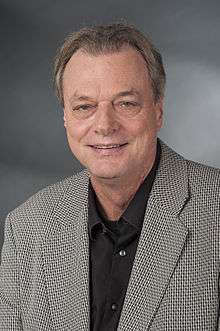Frithjof Schmidt
| Frithjof Schmidt | |
|---|---|
 | |
| Member of the Bundestag | |
|
Assumed office 2009 | |
| Personal details | |
| Born |
April 17, 1952 Bad Harzburg, Lower Saxony, West Germany (now Germany) |
| Citizenship | German |
| Nationality |
|
| Political party | Alliance '90/The Greens |
Frithjof Schmidt (born 17 April 1953 in Bad Harzburg) is a German politician and member of the Alliance '90/The Greens group in the Bundestag. Between 2004 and 2009, he served as Member of the European Parliament for Alliance '90/The Greens, part of the European Greens.[1]
Early life and career
Between 2006 and 2012, he was publisher-editor of German weekly newspaper Der Freitag.
Political career
Schmidt became a member of Alliance '90/The Greens in 1988. From 1996 to 1998, he was a member of the party's federal executive board under the leadership of Gunda Röstel and Jürgen Trittin.
Member of the European Parliament, 2004-2009
Throughout his tenure, Schmidt was a member of the Committee on Development, which he became the vice-chairman of in 2007. From 2005, he also served as a member of the ACP–EU Joint Parliamentary Assembly.
During his time in the European Parliament, Schmidt served as rapporteur on parliamentary resolutions on fair trade and development (2006) as well as on policy coherence for development and the effects of the EU’s exploitation of certain biological natural resources on development in West Africa (2008).
Member of the Bundestag, 2009-present

In the 2009 German federal elections, Schmidt was elected into the Bundestag. He has since been a member of the Committee on Foreign Affairs.
In his first term between 2009 and 2013, Schmidt was part of his parliamentary group’s leadership around co-chairs Renate Künast and Jürgen Trittin, in charge of foreign policy issues. He was re-elected to that position in 2013, this time under the leadership of Katrin Göring-Eckardt and Anton Hofreiter.
In August 2012, Schmidt was one of 124 members of the Bundestag to sign a letter that was sent to the Russian ambassador to Germany, Vladimir Grinin, expressing concern over the trial against the three members of Pussy Riot. “Being held in detention for months and the threat of lengthy punishment are draconian and disproportionate,” the lawmakers said in the letter. “In a secular and pluralist state, peaceful artistic acts -- even if they can be seen as provocative -- must not lead to the accusation of serious criminal acts that lead to lengthy prison terms.”[2][3]
Other activities
- German Council on Foreign Relations (DGAP), Member of the Presidium (since 2014)
- Heinrich Böll Foundation, Member of the Assembly (since 2014)
- Stiftung Asienhaus, Member of the Board of Trustees
References
- ↑ "Frithjof SCHMIDT". Your MEPs. European Parliament. Retrieved 14 February 2011.
- ↑ Henry Meyer (August 8, 2012), Madonna Urges Freedom for Anti-Putin Punk Girls at Concert Bloomberg News.
- ↑ Appell aus dem Bundestag: Deutsche Abgeordnete fordern Milde für Pussy Riot Spiegel Online, August 7, 2012.